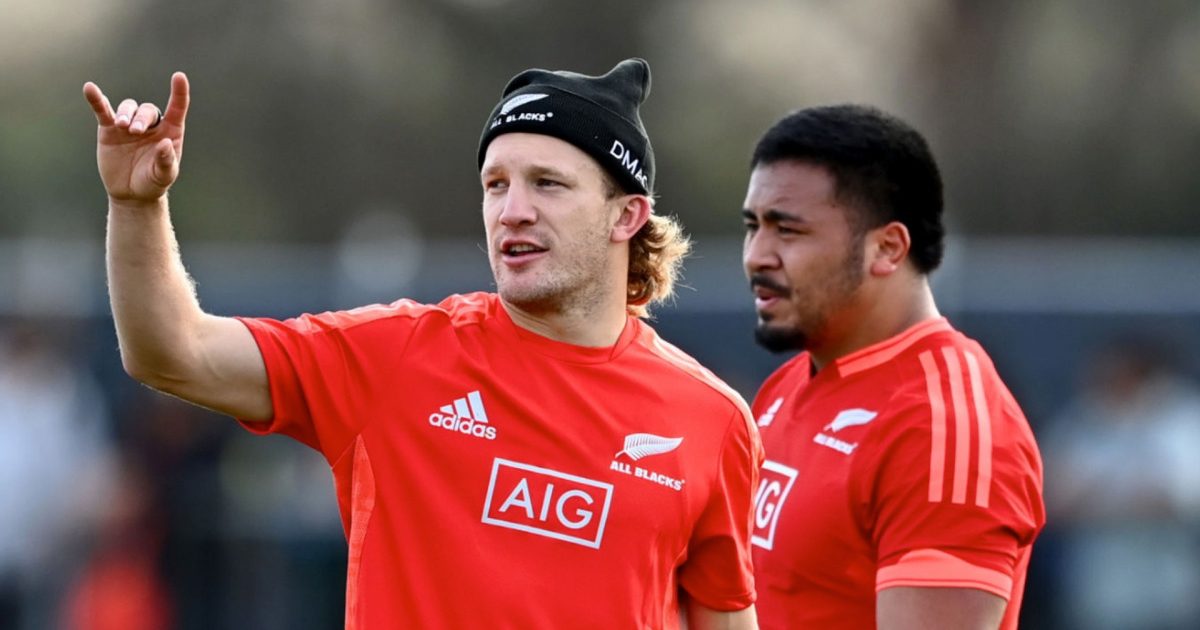'Great balance to his performance': All Blacks fullback race thrown open

After weeks of debate around how the All Blacks would potentially line up for their first outing of 2021, a dominant 102-0 victory over Tonga on Saturday evening served as a strong statement from players looking to secure a starting spot.
With so much quality contained within the squad, Ian Foster’s task of selecting a starting fifteen has not been made simple. There have been a whole range of tricky decisions to be addressed including players being selected in and out of their favoured positions, the applicability of a dual playmaker system and how best to utilise a versatile forward pack.
Thankfully for Foster, his team on Saturday looked assured and comfortable. Of course, the obvious response to that statement would be to point out the relative weaknesses of the Tongan team and the unfair hardships that that group of men have had to experience in order to even field a team. That is a point that is by no means to be ignored, but from Foster’s perspective, the performance of his own team will primarily be his focus.
The All Blacks certainly looked good on the weekend and if anything, whilst some of the aforementioned selection headaches will only have been made more difficult, the important thing for Foster will be that the systems deployed by the All Blacks generally appeared to work.
In terms of selection, Saturday night illustrated that the race to start at fullback remains very much in the balance. Will Jordan, Jordie Barrett and Damian McKenzie all enjoyed fantastic seasons from No 15 with their respective Super Rugby franchises. All played distinctly different roles within their clubs, with their various skillsets expected to offer Foster variation at the national level. Beauden Barrett’s return to the side from Japan was also a large factor requiring the coach’s consideration.
But with Jordan put on the wing and both Barretts benched, it was McKenzie who got the nod to start at fullback, going on to impress with a varied and mature display.
McKenzie has enjoyed a talismanic season with the Chiefs in 2021, often at times being a literal game-winner for the franchise on their march to a Super Rugby Aotearoa final. Making four starts at No 10 this season has also seen McKenzie further develop his game as a distributor and game manager, meaning that when dropped back to fullback, he remained able to share important responsibilities with whoever the Chiefs brought in at first five.
Maori All Blacks halfback Bryn Hall, speaking on the Aotearoa Rugby Pod this week, identified McKenzie’s game management as being crucial to the All Blacks victory.
“It was his ability to distribute that really facilitated that edge attack,” noted Hall. “He and Richie Mo’unga both made 39 passes each on the weekend … which put people in space and allowed the All Blacks to score out wide.”
Certainly, on the weekend, McKenzie seemed to show for the All Blacks that same element of his game that is so pivotal for the Chiefs – combining with Mo’unga to share the responsibilities of a first receiver and playmaker. Perhaps even more pleasing for Foster, was the fact that this system continued with the introduction of Beauden Barrett as Mo’unga replacement. McKenzie’s solid performance eventually saw him finish the match with a try and three try assists.
An inspired run at the World Cup or a one-off battle with the Lions is fine and well, but playing the likes of the #AllBlacks and #Springboks week upon week in an annual tournament poses a new challenge for Japan. #RugbyJP @JRFURugby
?? Gregor Paulhttps://t.co/YIzPm3bi6y
— RugbyPass+ (@RugbyPassPlus) July 5, 2021
Ex-All Blacks hooker James Parsons was equally as impressed with the innovation and freedom shown by McKenzie alongside his astute game management.
“[His] mental ability to just play what’s in front of him, rather than just having to stick to a set plan – I think it really showed through,” remarked Parsons. “[He and Rieko Ioane] were really instinctive on the night and … I thought Damian was great. He carried on that ability from the Chiefs, where he promotes himself to first receiver, he brought that kicking game … plugging the backfield when he needed to off the kick-offs and he was using his boot just to settle things down. He’s got that running game that we know, but he also started to link up.”
Used off the bench as an impact player in half of the All Blacks’ tests in 2020, Parsons was sure that Ian Foster would be pleased with the ever-evolving nature of McKenzie’s game.
“We’re so used to seeing Damian do those one-off counter-attacking runs and bust through about 15 people,” said Parsons. “But he just had a great balance to his performance on Saturday. We talk about those ‘duel playmakers’ … Damian’s a proven first receiver now and I think he’s shown that at Super Rugby level … he’ll be wanting to impose himself.”
Perhaps then, the ‘controversial’ dual playmaker system might still yet play a part in Foster’s game plan in 2021.





































































